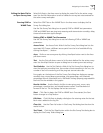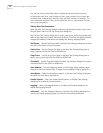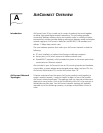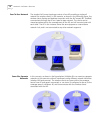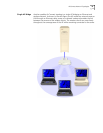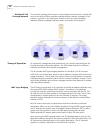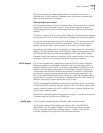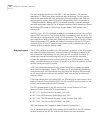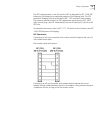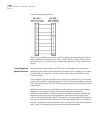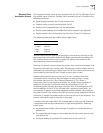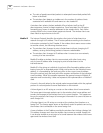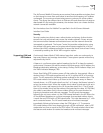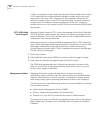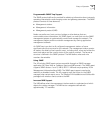
28 A
PPENDIX
A: A
IR
C
ONNECT
O
VERVIEW
A TIM is a compressed virtual bitmap identifying the AP associated wireless clients
in PSP mode that have buffered directed messages. wireless clients issue a poll
request when APs issue a TIM. A beacon with the broadcast-indicator bit set
causes the wireless client to note
DTIM Count
field value. The value informs the
wireless client of the beacons remaining before next DTIM. This ensures the
wireless client turns on the receiver for the DTIM and the following
BC/MC packet
transmissions
.
HTTP, HTML Web
Server Support
Hypertext Transfer Protocol
(HTTP) is the native language of the World Wide Web.
The HTTP protocol makes requests from browsers to servers and responses from
servers to browsers. This function provides the user with a Web-based format for
configuration and firmware download.
Web pages are written in
Hypertext Markup Language
(HTML). HTML allows the
user to create Web pages containing text, graphics, and pointers or links to other
Web pages or elsewhere on the page or document. Pointers are known as
Uniform Resource Locators
(URLs). A URL is essentially the name of the Web page.
The URL consists of three parts:
1
Protocol (or Scheme)
2
Fully Qualified Domain Name (FQDN), the machine where the page is located
3
Local name that identifies the page (usually the HTML file name)
The HTML language describes how to format the document, indication which
fonts to use, much like a copy editor describes which fonts to use, such as the
location, color, header size and text.
Management Options
Managing AirConnect includes viewing network statistics and setting
configuration options. Statistics track the network activity of associated wireless
clients and data transfers on the AP interfaces. Configuration involves, among
other things, setting system operating parameters and filters used in bridging.
The AP requires one of the following to perform a custom installation or maintain
the AirConnect network:
■
Simple Network Management Protocol
(SNMP)
■
Wired or wireless LAN workstation with a telnet client
■
Terminal or PC with RS-232 connection and access to ANSI emulation
Changing one AP does not affect the configuration of other APs on the network.
Make configuration changes to APs individually. Each AP requires an individual
IP address.



